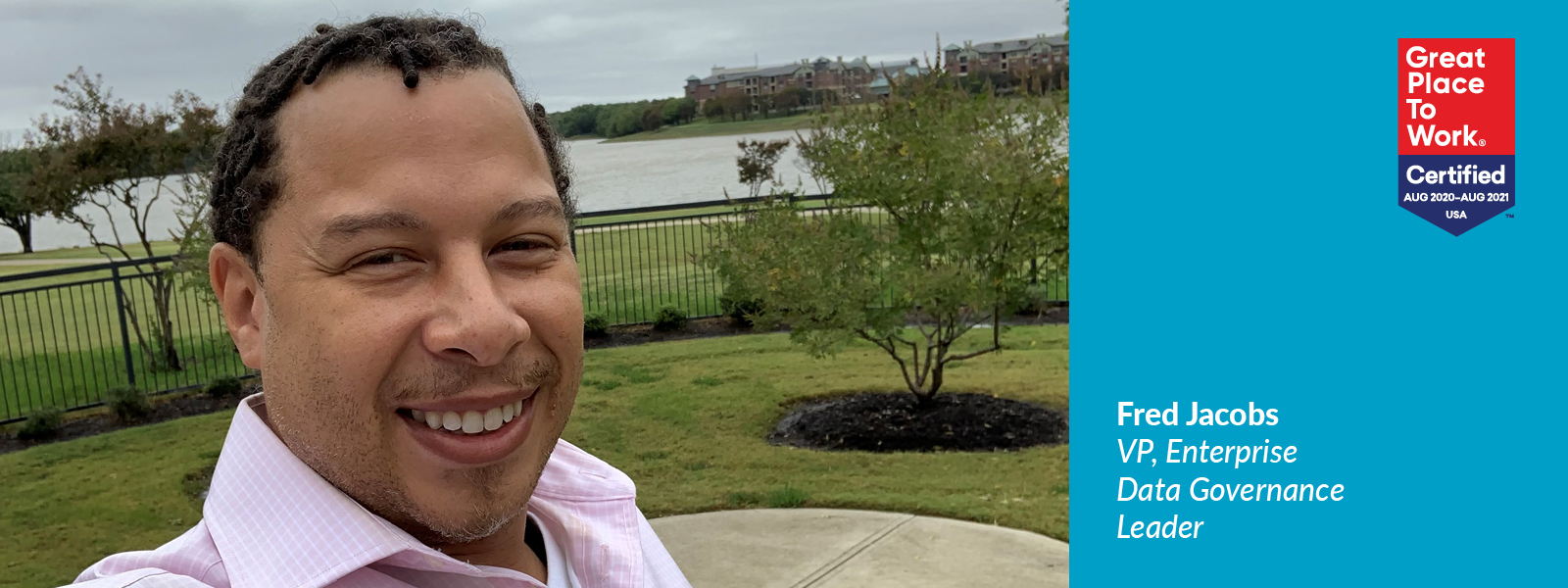Estimated reading time: 6 minutes
We have much to learn from each other, and each February during Black History Month, we are given the opportunity to honor, celebrate, and reflect on the achievements of Black people and the history and culture of the Black community.
Fred Jacobs, vice president of enterprise data governance and secretary of NAAC, our Network of African American Cooper resource group, is a passionate and vocal leader who plays an important role in leading by example. He shares with us many lessons about the Black experience.
What does being a member of NAAC group at Mr. Cooper mean to you?
Being a member of the NAAC Resource Team at Mr. Cooper provides me the opportunity to serve my fellow Coopers of all races and have a particular impact in service of Black Coopers. We are also afforded the opportunity to serve our external community through efforts that we choose, or that have special meaning to us as members.
Who is a Black leader from history or a role model from the present that you admire, and what important advice or lessons have you learned from them?
There are several from the present and past:
- Frederick Douglass: Because his work debunked the prevailing theory that former slaves lacked the intellectual capacity to function as free citizens.
- Harriett Tubman: Because she escaped to freedom but was unselfish enough to lead 13 missions back into slaveholder territory to help another 70 former slaves to freedom (through the Underground Railroad). She got out, and she freely thchose to risk her life to go back for her people.
- Madam C.J. Walker: Because her work demonstrated that Black people could be successful entrepreneurs. She was the first female millionaire of any race.
- George Washington Carver: Because his work demonstrated that Black people could be scientists and have a meaningful impact. Most people think of his work developing products made from peanuts, but it was his development of systematic crop rotation techniques designed to restore nitrogen and improve soils depleted by repeated plantings of cotton that had the biggest impact to farmers of all races.
- Supreme Court Justice Thurgood Marshall: Justice Marshall demonstrated that Black people could be successful lawyers and even make it to the Supreme Court of the United States. His argument in Brown v. Board of education paved the way for me personally to be able to go to desegregated schools and receive a top-notch education during my lifetime.
- Dr. Martin Luther King Jr.: Arguably the most important and influential Black Leader in American history. In the history of the world, the vast majority of formerly oppressed people gained their freedom and equal rights through violent and bloody conflict. However, Dr. King’s leadership facilitated his change in America through non-violent civil disobedience.
- President Barack Obama: Demonstrated that a Black person could become president of the United States. So today, I can sincerely look my daughter in the eyes and tell her that she can be president if she works hard and wants to achieve that goal.
What do you wish people knew or understood more about the Black experience?
A few things:
- Black people are just people. Though we have differences in our culture and experiences, underneath it all, we are no different than you. We bleed, we cry, and we want the best for our families…just like every other person in this world.
- Black people don’t want any special favors or handouts. All we want is the same opportunities to educate ourselves, to have a job, and work hard for a living wage and to start businesses…just like every other person in this world.
- To white Americans: Black Americans are not a threat to you. Generally speaking, Black people are more afraid of you than you are of us. History has seen a vast difference in the number and scope of Black people being killed, physically harmed, verbally abused and denied opportunities for economic advancement and wealth by white people than vice versa. Even though you have enslaved and terrorized us throughout history, we do not seek vengeance or retribution. We are a peaceful, God-fearing people.
- Black Americans are patriots: We love our country, even though it doesn’t always love us. This country was literally built on the backs of black people’s labor. This means Black history is American history, and we are proud Americans.
If someone wants to show support for the Black community, what are the best ways to show support?
There are a few that I would recommend:
- Start at home. Teach your children not to hate us. Racism is a learned behavior, and in my opinion, it will take a few more generations before it is completely eradicated from our society. So, start today because the longer we wait, the longer it will take.
- Then move to your neighbors and community. Work to influence your racist friends. Working to change hearts and minds is difficult, but necessary. Remind those people that we are all Americans, and that our country is better and stronger when we stand together united as countrymen than we are when we are divided amongst ourselves.
- Then take it one step further. Advocate to reform laws and remove institutional racism. For starters, do some research on redlining and its impact on Black people’s ability to own homes and build wealth. Also, do some research on the disproportionate incarceration of Black Americans, and the underlying laws and policies that are the root cause. Then demonstrate to your local, state, and national elected officials that this does not reflect the will of the American people.
In what ways have you felt supported at work with the events that unfolded in the last few months that affected the Black community?
I am proud of the way Mr. Cooper has demonstrated its commitment to equality, diversity, inclusion, and justice for all. After George Floyd’s murder, our CEO Jay Bray recognized that Black people across this country were hurting and he took action to address this pain head-on with Black Coopers. Among other actions, he directed our Office of Diversity and Inclusion to set up listening sessions for all Coopers. These sessions provided Black Coopers the opportunity to share their feelings, experiences, and pain. They also provided Coopers of other races an opportunity to listen, learn, and ask questions. Additionally, Jay set the tone with all the executives and managers to be sensitive to Black Coopers pain and to check in with us as individuals; to listen and learn how they could support us through this difficult time.
I would also recognize my direct manager, Kurt Johnson, Mr. Cooper’s chief credit officer. In addition to Kurt’s commitment to me as one of his individual direct reports, Kurt also seeks opportunities to help the broader Black community. In 2020, Kurt pulled me into discussions with the Mortgage Bankers Association (MBA) whereby we supported their CONVERGENCE Memphis program that provides support to low-income borrowers local to Memphis, Tenn., and helps them realize the dream of homeownership. As a result of Kurt’s efforts on this item, Mr. Cooper gave a $20,000 donation to that program. In 2021, Kurt, others, and I are continuing our work with the MBA in support of their “Expanding Homeownership to close the Racial Wealth Gap” program(s). Jay, Kurt, and many other leaders at Mr. Cooper both “talk the talk, and walk the walk” of equality, diversity, inclusion, and justice for all, and they make me proud to be a Cooper.







